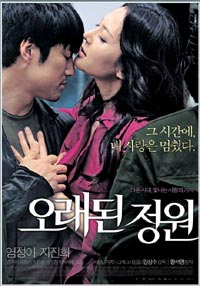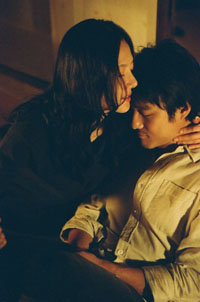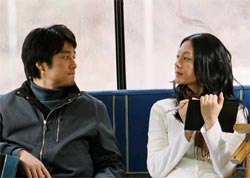Time and Tide: San Francisco International Film Festival (Part 6)
 |
"Life is long, history is longer."
-- Oh Hyung-Woo, The Old Garden
One of the reasons modern Korean cinema is so popular, in my humble opinion, is that it rides a fine line between drama and melodrama. If nothing else, there's passion in there, even when things go over the top. At their best they remind me of classic Hollywood films, using popular formulas for unusual ends (like the monster-horror film The Host, where the true horror isn't the monster but the American military-industrial complex). In introducing The Old Garden, presenter Roger Garcia put forth the notion that the film hearkens back to the "integrity of mid-90s Korean cinema." Armed with that supposition, and knowing that this film concerned the infamous Gwangju massacre and its aftermath, I was expecting a full-on tear-fest, an emotional wringer.
There's certainly some of that going on in The Old Garden, but it's a much different movie than that, and is ultimately more interesting because of it. The bare-bones story is pretty conventional -- former activist Oh Hyung-Woo (Ji Jin-Hee), finally released from prison after 16 years and 8 months, returns to a modern Korean society more fascinated with designer suits and organic food than the democratic ideals that he and his comrades risked their lives for two decades earlier. In passages that wouldn't be out of place in a Hemingway novel, he takes a long solitary trek out to the countryside, where he once sought refuge from the police years before, and idled away his forced "vacation" in the cabin of teacher and painter Han Yoon-Hee (Yum Jung-Ah). Yoon-Hee is now dead, and as Hyung-Woo reminisces about the brief tryst he had with her, he discovers that Yoon-Hee had a daughter who might be his...
 |
 |
It all comes together with a reunion of father and daughter in the winter streets of Seoul, and even then we don't get sentimentality, just a bemused meeting of two strangers. The past may be fabrication, as Yoon-Hee demonstrates with a final painting in which a handsome portrait of Hyung-Woo as a youth sits side-by-side with a realistic portrait of a chemotherapy-ravaged Yoon-Hee, but the acts of imagination and longing conquer all. Not so much about resignation as it is about acceptance, The Old Garden is a delicate reverie with a slight smirk; "We've all become asswipes!" one of the characters snarls at one point, and this may be true, and yet this fact is acknowledged and forgiven.


0 Comments:
Post a Comment
<< Home